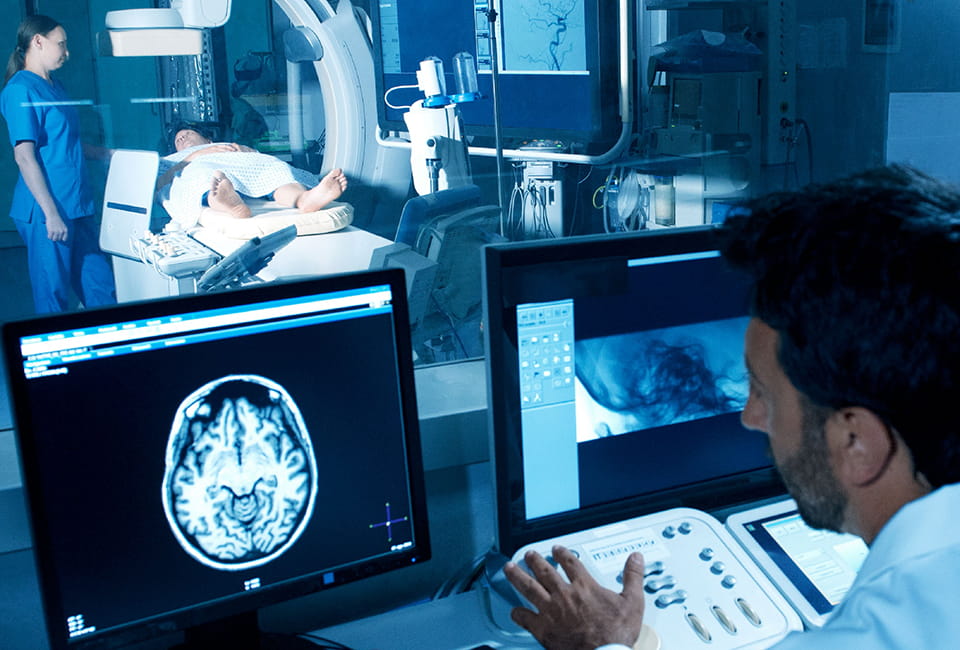Advanced Care for Brain and Spinal Cord Tumors
Being diagnosed with a brain or spinal cord tumor can be difficult for you and your family. You will need a team of specialists skilled in the latest diagnostic and treatment options. At Orlando Health Cancer Institute Neuro-Oncology Center, we offer a compassionate, multidisciplinary approach to ensure you receive the best care.
Our team includes fellowship-trained neuro-oncologists, neurosurgeons, radiation oncologists and specialized nurses, working together to develop a care plan tailored to your unique needs. Our board-certified doctors have years of experience treating both common and rare brain and spine tumors. With all types of brain and spine tumors, our advanced skills and the latest technology are vital to treatment outcomes. But more than that, we will motivate you throughout your treatment by forging a strong relationship with you and your family.
Types of Cancer
There are more than 150 documented brain tumors, and they are generally divided into two groups: primary and metastatic. Primary tumors start in or around the brain. They are classified as glial or non-glial, depending on the type of cells from which they originate. They may be malignant (cancerous) or benign (noncancerous).
Metastatic tumors are those that first developed somewhere else in the body, such as the breasts or lungs, before spreading to the brain. They are malignant and are found in 25 percent of cancer patients. Unfortunately, up to 40 percent of people with lung cancer will develop metastatic brain tumors. More sophisticated diagnostic tools, in addition to innovative surgical and radiation approaches, have increased survival rates and allowed for an improved quality of life.
Tumors include:
This is the most common type of brain tumor in adults, accounting for more than three of every four malignant brain tumors. These tumors start in glial cells that surround and support nerves. There are different types of gliomas, which will affect the course of your treatment. Among the gliomas:
- Astrocytomas: The most common type of glioma represents about half of all primary tumors found in the brain and spinal cord. They develop in glial cells known as astrocytes, often in the cerebrum. They are more common in middle-aged men.
- Ependymoma: These tumors form in the ependymal cells found in passageways used to move cerebrospinal fluid to your brain. These occur most often in young children. In adults, they are more likely to be found in the spinal cord, where they may cause weakness in parts of the body.
- Glioblastoma: Also known as glioblastoma multiforme, this is the most invasive of glial tumors. They tend to grow quickly and spread to other healthy tissue. There is no cure for these tumors, though treatment can slow their spread. They are more common in men between the ages of 50 and 70.
- Oligodendroglioma: These glial tumors start in cells called oligodendrocytes, which are responsible for making myelin, a substance that protects nerves and helps transmit electrical signals through the brain and spinal cord. These tumors are more common in adults.
This tumor starts in the cerebellum – the lower back of the brain – which helps with muscle coordination, balance and movement. The tumor may spread through cerebrospinal fluid to other parts of the brain. These are most common in young children.
This rare non-Hodgkin lymphoma is caused by cancerous lymph tissue cells forming in the brain or spinal cord. The cancer can also spread to the brain from other parts of the body. This is found most often in people over the age of 50.
These tumors form under the brain and the bottom of the skull, making them difficult to treat. While they are often benign, they can be life-threatening because of their proximity to important nerves and blood vessels. Among the skull base tumors:
- Chordoma: These benign skull base tumors are commonly found at the base of the skull or lower spine.
- Pituitary tumor: These are unusual growths (mostly benign) found in the pituitary gland, which is behind the nose and is responsible for making and storing hormones.
- Craniopharyngioma: These are usually benign but difficult to remove since they tend to form from the pituitary gland.
- Meningioma: This usually benign tumor forms in the membrane that surrounds the brain and spinal cord.
Risk Factors
Brain and spinal cord tumors are created by the mutation of DNA in cells in or around the brain. Some people are born with these defective cells, while others acquire them over time. These changes can affect the way cells operate, depriving them of the ability to repair themselves or to self-destruct when damage cannot be repaired. When those internal controls are lost, the damage can eventually lead to a tumor.
Unfortunately, it is not clear what causes these DNA mutations. Often, we never know why someone develops a brain tumor. In rare instances, a family history of brain tumors can be a warning sign. A weakened immune system and exposure to radiation – often related to the treatment of another condition – can also be factors, though rarely.

Meet the Team
For excellent care, it’s important to have a multidisciplinary team of experts from different fields that works together. All of our providers are experts with years of experience treating all types of tumors, both common and rare.
Our team includes neuro-oncologists, neurosurgeons, radiation oncologists, neuro-radiologists, neuropathologists and a clinical trial team. We also have physical therapists, occupational therapists, speech therapists and behavioral medicine specialists.
The team gathers weekly for careful discussions about every patient. Your care plan is built through this collaborative approach that delivers the best treatment possible.
-
Clinical Trials
When appropriate, we also offer our patients the option to participate in clinical trials to try a promising new medical drug or other treatment.
-
Diagnosis and Treatments
Making treatment decisions can be overwhelming. Our promise is to work with you to find the best treatment plan for you or your loved one.
-
Resources
At the Orlando Health Cancer Institute, we strive to support patients and families in every way possible.
Choose to Stay in Touch
Sign up to receive the latest health news and trends, wellness and prevention tips, and much more from Orlando Health.
Navigate Your Health


Find a Cancer Physician
Find a Cancer Physician
Meet our doctors who specialize in the full range of cancer care. Our team of experts has experience in a variety of specialty areas. Together, we provide comprehensive evaluation, diagnosis and treatment options.
Learn More

Patient Portal
Patient Portal
If you are a patient at Orlando Health Cancer Institute, our free online patient portal provides an easy and secure way to manage your health information. Reach us from any location at a time that’s convenient for you.
Learn More

Virtual Visit
Virtual Visit
Need to talk with a doctor, but don’t want to leave your home? Try our virtual visit (telehealth) option to connect with a physician from your phone, tablet or computer.
Learn More


